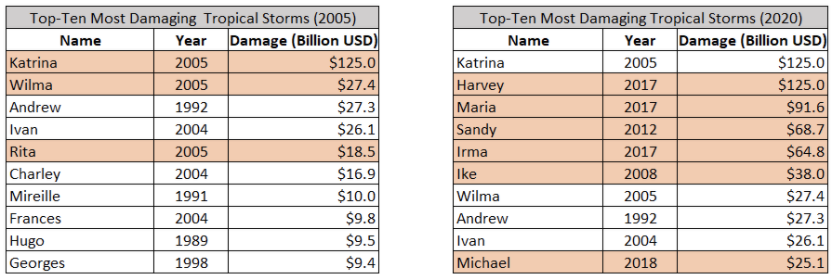Globalization has led to the rapid development of industries, nations, and economies worldwide. Countries have become so interconnected and reliant on each other for trade, manufacturing, and procurement that issues starting in one nation may end up causing major economic impacts for a multitude of others on the other side of the world. Natural disasters can have long-lasting effects on both small and large-scale economies, often occurring randomly, and without warning, major natural disasters have been few and far between. However, as a result of climate change, certain types of disasters are becoming more destructive and frequent and are threatening to impact the global economy.
Community Damage
As severe storms and large-scale inclement weather events become more frequent due to climate change, the costs associated with repairing both the physical damage and the associated economic loss begin to take on new heights.
By the time the infamous 2005 cyclone season was over, three storms had cracked the top-ten most damaging tropical storms list: Katrina (1st; $125.0 billion USD), Wilma (2nd; $27.4 billion USD) and Rita (5th; $18.5 billion USD).
Together, those three storms alone accounted for $171 billion in physical damages, the other seven on the list combined for $109 billion over a span of 16 years. Since then, however, tropical storms have become more frequent and much stronger than in previous years. Six new storms have entered the top-10 since Katrina, totaling over $413 billion in physical damages.

While these numbers are already high, they do not reflect the costs of economic recovery, the loss of life, livelihoods as well as the short and long-term impacts on local industries.
For example, the 2018 California wildfires cost $16.5 billion in physical damages, but certain pundits estimated they caused a $400 billion economic loss to the State.
In a similar vein, the cost of the Australian bushfires that ravaged the nation’s south-east in late 2019 and early 2020 has risen to $65 billion but has devastated small communities heavily reliant on farming and tourism, which could heavily impact the nation’s economic output.
Additionally, economic projections show that some of the world’s largest companies are at risk of losing a trillion USD in the next five years as the result of climate change.
As the impacts of climate change have worsened for the past few decades, the human and economic costs associated with environmental disasters have continued to climb, underlining the need for large-scale wide-ranging policies to be implemented to reduce carbon emissions and mitigate the effects of climate change.
Economists are united in their conclusion that climate change will severely hamper the global economy – but even more so if solutions aren’t implemented. Renewable energy alone could help save $160 trillion in climate change costs by 2050, while an economic transition towards more environmentally-friendly manufacturing could generate $2 trillion in opportunities.

Agricultural Insecurity
Climate change is affecting the Earth’s biota, changing weather patterns have altered farming cycles, and degraded environments are reducing the effectiveness of agricultural techniques. The impacts of climate change will be different across the world, making research into agricultural adaptation necessary on a local scale.
While the issues affecting specific locations will be as diverse as the local environments themselves, a consensus has formed that the effects of climate change will severely affect food security. A recent study shows that even low changes in climate would make food importers especially vulnerable, causing a shift in economic welfare and exacerbating the rift between developed and developing nations.
The effects of climate change on agriculture illustrates the inequality created by its impacts. Poorer nations will be less robust agricultural sectors, limited access to adaptive solutions, and unable to pay to upgrade their infrastructure will be left behind as larger, richer nations are able to cope with changing weather patterns and lower crop yields.
However, there exists one issue that may prove to affect all nations regardless of economic strength: hydrological droughts. Defined as a drought caused by a lack of total available water, hydrological droughts have already affected several nations’ agricultural sectors.
Increasing temperatures and changing rainfall patterns are expected to aggravate the issues in already water-insecure areas, encouraging drought conditions and destabilizing local economies.
Several former UN Secretaries-General have expressed fears surrounding how future wars may no longer be waged to protect ideals, but to secure water. Some experts believe that climate change may have already led to one major conflict: the 2011 Syrian civil war.
On top of mounting political pressures in the country, it is believed that increased desertification, poor water security, record-breaking droughts, and a failing agricultural sector added to internal turmoil.
A fierce debate has raged over whether or not climate change had an influence on the causes for the conflict, but it has been a widely-accepted fact that climate change will be the root cause of mass migrations and a plethora of public health issues like those showcased by the Syrian civil war.

Environmental Migrants
Climate change will impact several aspects of human life, but large displacements of people have the potential to create a humanitarian crisis. The United Nations High Commission for Refugees (UNHCR) sees the consequences of climate change as “extremely serious”, acknowledging the dangers environmental degradation will have directly on public health as well as that of mass migrations.
Harsher climates coupled with stronger storms along with a growing lack of food and water security will drive migrants towards better-faring regions. These conditions are already a reality, with displacements of various scales recorded globally in response to major environmental disasters – however, more support is needed to efficiently manage these situations.
A recent study has illustrated the dire situation of low-lying island nations who have been affected by rising sea levels and large-scale severe weather events, finding that most will be uninhabitable by 2050. The International Organization for Migration (IOM) estimates that between 25 million and 1 billion people could be displaced as a result of the impacts of climate change by 2050.
Some nations are especially vulnerable to environmental impacts, and countries will have their infrastructure challenged at different rates, exacerbating inequalities and reducing the effectiveness of public health services. These pressures are already driving climate-related migration, and policy-makers have described it as a fight for survival more than one to conserve public health.
In 2014, Kiribati President Anote Tong called out to the world for more help in combating climate change, “Our future days are numbered, our islands will be severely affected to the extent that within the century – perhaps even before that – a substantial part of our islands will be underwater,” he continues, “This is not a problem that any individual, any single nation can deal with, it is a problem that requires remarkable global leadership.
A lot of people will not react until their own world is under threat, but what they need to understand is that our world is being threatened. We are the first on the front line and they will be the next if nothing is done.”
Finding a Solution
The socio-economic impacts of climate change can already be felt making the need for immediate action a necessity, not a choice. Smaller nations are more vulnerable to shifts in climate, as evident in the rash of severe storm events or climate-related hardships that have befallen them in recent years.
It is much harder for these smaller nations to effectively recover, but their struggle hasn’t been part of media coverage until recently when larger countries have started to become affected.
Economic inequality is certain to be a major talking point if action isn’t taken to reduce carbon emissions and mitigate the consequences of climate change. Strong economic powers will only be able to ignore these issues for a limited time before the impacts begin to negatively affect their own interests – but will it be too late to find a solution by then?








